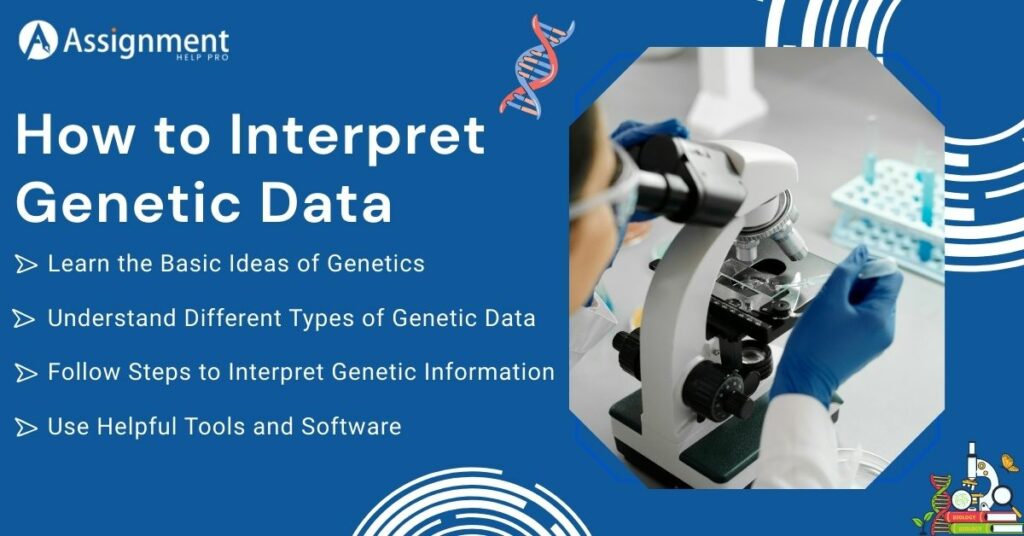Learning how to write lab reports and interpret genetic data will make it easy for you to do your biology assignments and research. If you want to perform this task accurately, you must have strong knowledge of basic concepts and the standard structure of the biology lab report. Otherwise, you can get biology assignment help from experts.
Biology is an interesting but sometimes complicated subject that studies life in different ways, from tiny molecules to whole ecosystems. If you are studying biology in high school or college, then as a part of your course curriculum, you will often be asked to prepare various kinds of assignments on interesting biology concepts. In general, many students experience challenges in writing biology assignments, especially when they deal with lab report creation and genetic data interpretation. So, to accurately finish the task or enhance their knowledge of the topic, they seek assignment help from experts. You can also get to know how to write lab reports and interpret genetic data for biology assignments by reading this blog.
What is a Biology Lab Report?
Lab reports are an important part of learning biology. They will help you explain your experiment in a clear and organized way. In a biology lab report, you will have to write about what you did, how you did it, what you observed, and what it means. Generally, writing a biology lab report will help you understand an experiment better.
How to Write a Biology Lab Report
Do you know how to write a biology report? If you are clueless about it, then follow these steps
Understand the Purpose
Before you start writing your biology report, make sure to identify the purpose of the report. A biology lab report is more than just telling what you did. Specifically, in the report, you should mention how you planned the experiment, what results you got, and how you made sense of those results. Overall, your report should reflect your thinking and understanding of the experiment.
Structure the Lab Report
Once you are clear with the purpose, prepare the biology lab report by including several sections. Each section should serve a different purpose and help you explain your experiment clearly. These parts are important to organize your work and share your findings effectively.
- Title: Make it concise but descriptive. It should clearly state what your experiment is all about.
- Abstract: Write a brief overview (about 150-200 words) that covers the purpose, methods, main results, and conclusions of your experiment.
- Introduction: Give background information, state your hypothesis, and explain the goal of the experiment.
- Materials and Methods: List the materials you used and describe the steps you followed so others can repeat the experiment.
- Results: Share your findings clearly using text, tables, and figures, but don’t interpret them here.
- Discussion: Explain what the results mean, why they matter, and how they relate to your hypothesis and other scientific knowledge.
- Conclusion: Sum up the main findings and their importance.
- References: Cite all the sources you referred to in your report.
Proofread and Edit
Mistakes can lower the quality of your biology lab report. So, before submitting the report, check for spelling mistakes, grammar errors, and scientific accuracy. Also, make sure your data is presented clearly and consistently.
Biology Lab Report Writing Tips
The following are some tips that will help you enhance the overall quality of your biology lab report
- Create the title and abstract after finishing your report so they accurately describe the experiment.
- Write a short introduction with background details and a clear research question.
- Describe the materials and steps in the past tense, with enough detail for someone to repeat the experiment.
- Present your results using graphs or tables, and label everything clearly.
- Explain what the results mean, mention any possible errors, and suggest ideas for future experiments.
- Keep the conclusion short and highlight the main points from your findings.
What is Genetic Data Interpretation?
Genetic data includes information about an organism’s DNA, such as gene sequences, mutations, and inherited traits. Genetic data interpretation involves analyzing this information to understand how genes affect traits, identify variations, and detect genetic disorders. It is essential for studying inheritance, diagnosing conditions, and conducting biological or medical research.
How to Interpret Genetic Data
Genetics is a fast-growing area of biology, and learning how to interpret genetic data is important for today’s biology students. If you have no idea how to interpret genetic data, then follow these steps
Learn the Basic Ideas of Genetics
Before you start working with genetic data, learn and understand some basic concepts. You should know what DNA and RNA are, how genes and alleles work, and the difference between genotype and phenotype. It is also helpful to understand how traits are passed down through Mendelian inheritance and how mutations can affect genes. Learning the fundamental topics will help you think more clearly and make better sense of the data.
Understand Different Types of Genetic Data
After that, get to know about the genetic data types. The kind of genetic data you work with will affect how you analyze and interpret it.
- Sequence Data: This includes the basic DNA or RNA code. It typically shows the order of nucleotides.
- Genotype Data: This tells you which versions of a gene (alleles) a person or organism has.
- Phenotype Data: These are the physical traits you can see, like eye color or height, which are affected by genes.
- Gene Expression Data: This shows how active certain genes are, often measured by looking at how much mRNA is made.
- Pedigree Analysis: This involves studying family trees to see how traits are passed from one generation to the next.
Follow Steps to Interpret Genetic Information
Next, interpret genetic data by executing these steps
- Initially, check the data for any errors, missing parts, or problems.
- Find key genetic changes, like mutations or SNPs, and note their location and type.
- Look at how traits are inherited and decide if they follow dominant, recessive, or sex-linked patterns.
- Compare your genetic data with standard reference genomes to spot any differences.
- Figure out if these differences could change how a gene or protein works by using any relevant online tool.
- Finally, explain what the genetic data shows and whether it supports your original idea or not.
Use Helpful Tools and Software
Many tools and software can help you interpret genetic data more easily and accurately. For example, you can compare sequences with BLAST, visualize them with Geneious or SnapGene, predict mutation effects with PolyPhen or SIFT, and track inheritance using pedigree charts.
Challenges of Writing Biology Assignments
Doing biology assignments, especially lab reports and genetic data interpretation, can be tricky. These are some common challenges that many students experience in biology assignment writing
- Biology concepts can be hard to understand. This makes reports and data interpretation difficult.
- Genetic data often requires tools and software that students may not know how to use.
- Lab reports must be precise, and small errors can affect the outcome.
- Experiments and report writing take a lot of time and effort.
- Scientific writing can be tricky due to formatting and clarity requirements.
- Results may be unclear, and it may require careful thought and analysis.
If you face any of these challenges, you may get botany assignment help from experts. Obtaining professional guidance from specialists will improve your subject comprehension and help you finish your academic work perfectly.
Wrapping Up
Learning to write biology lab reports and interpret genetic data is useful not just for school but also for future science and research work. Typically, these are challenging assignments, but by following the steps and tips suggested in this blog, you can finish the tasks effectively. In case you are struggling with lab report creation or genetic data interpretation, get our personalized biology assignment help online. Getting assistance from our biology assignment experts will help you improve your knowledge, accurately finish work on time, and secure top grades.





